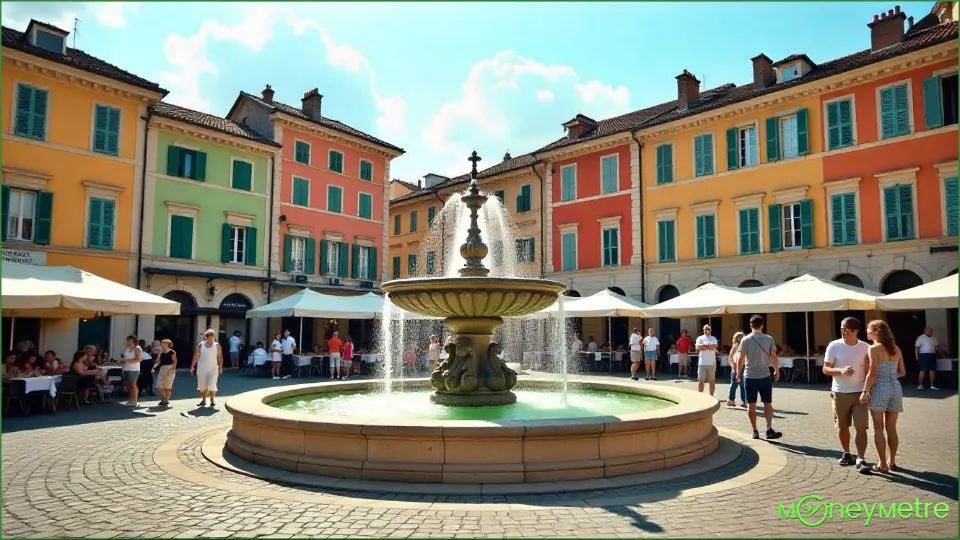Taking a vacation is more than just an escape; it’s a chance to rejuvenate, explore new cultures, and create memories that will last a lifetime. Traveling, especially to beautiful destinations like Europe, helps to break away from the everyday routine, reduces stress, and enhances creativity.
And while many Indians dream of a European holiday, the thought of expenses often holds them back. But with a bit of planning, you can learn how to plan a European vacation on a budget and make this dream a reality without breaking the bank.
Let’s first understand why taking a vacation is essential, and then explore some tips for planning an affordable European trip.
Why Taking a Vacation is Essential for Everyone?
1. Mental and Physical Health Benefits
A vacation gives you a break from your routine, helping reduce stress and increase productivity. Research shows that taking time off can improve mental health, reduce the risk of heart disease, and enhance overall happiness.
2. Improves Relationships
Traveling with family or friends strengthens bonds, as shared experiences create wonderful memories and deepen connections. Vacationing together fosters quality time that often isn’t possible in everyday life.
3. Broadens Horizons
Exploring different cultures, foods, and languages expands your perspective and enriches your understanding of the world. Traveling to Europe is particularly eye-opening, with its mix of history, art, and architecture.
Now, let’s dive into how to plan a European vacation on a budget with some practical strategies that allow you to enjoy Europe without overspending.
10 Tips to Plan a Budget-Friendly European Vacation
1. Travel During the Off-Season
Europe is busiest in the summer (June to August), making flights, accommodations, and tourist spots pricier. To save significantly, plan your trip in the off-season, between November and March.
Winter also has its charm in Europe, with fewer crowds and cozy winter markets in cities like Prague, Budapest, and Vienna.
2. Look for Budget Airlines and Book Flights Early

Europe has many budget airlines like Ryanair, EasyJet, and Wizz Air that offer flights within Europe at incredibly low prices. For international flights from India, use fare comparison sites like Skyscanner or Google Flights to monitor prices and book when they’re low. Booking your flights 3–4 months in advance can also help you secure better prices.
3. Choose Affordable Accommodation Options
Instead of luxury hotels, look for budget accommodations like hostels, guesthouses, and Airbnb rentals. Hostels in Europe are clean, safe, and ideal for solo travelers or young groups.
Airbnb offers a range of options where you can rent an entire apartment, giving you more privacy and a chance to cook your own meals, saving you more money.
4. Opt for Public Transportation

European cities are known for their efficient public transport systems, including metros, trams, and buses. Skip the taxis, which can be expensive, and instead use public transport.
Look for multi-day or group passes, as they offer unlimited travel at a discounted rate. For intercity travel, trains like the Eurail can be budget-friendly if booked in advance.
5. Cook Your Own Meals or Opt for Street Food
Eating out in Europe can be expensive, so consider accommodations that provide kitchen access. You can easily buy fresh produce from local supermarkets or farmers’ markets and cook your own meals.
For those who want to enjoy local food, street food is an affordable way to try local flavors without spending a fortune.
6. Plan Your Itinerary Wisely
Focus on fewer destinations to reduce travel costs and spend more time enjoying each place. Visiting fewer cities allows you to truly experience each location without rushing, and it helps avoid high intercity travel expenses.
For example, you can explore France and Spain together or focus on Eastern European countries like Hungary and Poland, which are generally cheaper.
7. Take Advantage of Free Attractions

Europe is filled with attractions that don’t require an entry fee. From public parks and historic neighborhoods to many free museums and churches, you can explore plenty without spending much.
In cities like London, Paris, and Rome, you can join free walking tours that are both informative and budget-friendly (though tips are appreciated).
8. Look for City Tourist Passes
Many European cities offer tourist passes that provide entry to top attractions, public transportation, and even discounts at certain restaurants.
Passes like the Paris Pass, Rome Pass, and Vienna Card can save you a significant amount if you plan to visit multiple attractions.
9. Avoid Currency Exchange Fees
Currency exchange fees can add up, especially if you’re exchanging money frequently. Avoid airport exchange counters, as they often have higher fees.
Instead, opt for a travel-friendly Forex card or use your debit/credit card at ATMs in Europe to get better rates. Certain forex cards, like the Niyo Global Card, are designed for Indians traveling abroad and offer favorable rates.
10. Be Smart About Souvenirs
Instead of purchasing expensive souvenirs at touristy shops, explore local markets where items are usually cheaper and unique. You can also consider making a digital scrapbook with photos and experiences, which can be as valuable as physical souvenirs.
Planning an affordable European vacation doesn’t mean compromising on experiences. By following these tips on how to plan a European vacation on a budget, you’ll be well on your way to exploring Europe without overspending.
Conclusion
Planning a European vacation on a budget is possible with the right strategies and careful planning. By traveling off-season, choosing budget accommodations, and making the most of free attractions, you can enjoy a rich and fulfilling experience without straining your finances.
Learning how to plan a European vacation on a budget is all about prioritizing experiences over luxury. With these ten tips, you can create a memorable European adventure that’s both affordable and enjoyable.
Read Also: 10 Best Budgeting Apps for Windows: A Guide to Managing Finances Efficiently
FAQs on How to Plan a European Vacation on a Budget
-
What are the best budget airlines for traveling within Europe?
Some of the best budget airlines in Europe are Ryanair, EasyJet, and Wizz Air. They offer frequent flights at affordable rates across popular European destinations.
-
Is traveling in Europe safe for solo Indian travelers?
Yes, Europe is generally safe for solo travelers, including Indians. However, it’s essential to follow standard safety precautions, stay in reputable accommodations, and keep your belongings secure.
-
How much should I budget for a week in Europe?
A week-long budget trip to Europe can range from ₹60,000 to ₹1,00,000, depending on your choice of destinations, accommodations, and activities.
-
Can I survive in Europe with just English?
Yes, English is widely spoken in major European cities, especially in tourist areas. However, learning a few basic phrases in the local language can be helpful and appreciated.
-
Which European countries are the most affordable?
Eastern European countries like Hungary, Poland, and the Czech Republic are generally more budget-friendly compared to Western European destinations like France and Switzerland.
-
Where can I find good travel insurance for a European trip?
You can find affordable travel insurance options through providers like ICICI Lombard, TATA AIG, and Bajaj Allianz. Travel insurance is highly recommended to cover any unexpected incidents.
Read Other Latest Posts Below







